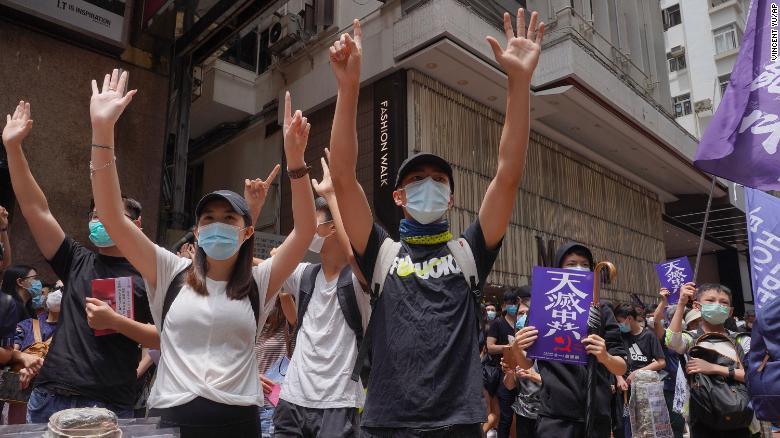US Blocks Visas For Chinese Officials & Their Families Over Hong Kong Crackdown
Tyler Durden
Fri, 06/26/2020 – 13:10
In the fast escalating tit-for-tat Washington blitz on China, the Trump administration Friday announced sanctions on top Chinese Communist officials which bar them and even their family members from entering the United States.
It’s a severe punitive move for Beijing’s recent crackdown on Hong Kong’s autonomy. Secretary of State Mike Pompeo in announcing the measure – a major shot across the bow no doubt – as part of “carrying out the President’s orders” further consistent with a congressional law.
The new visa restriction measures will apply to current and former top Chinese Communist Party officials “who are believed to be responsible for, or complicit in, undermining Hong Kong’s high degree of autonomy.”

“The United States calls on China to honor its commitments and obligations in the Sino-British Joint Declaration – namely that Hong Kong will ‘enjoy a high degree of autonomy’ and that human rights and fundamental freedoms, including the freedoms of expression and peaceful assembly, will be protected by law and respected by governing authorities in Hong Kong,” Pompeo’s statement said.
Congress last year passed the Hong Kong Human Rights and Democracy Act, requiring the administration to review whether mainland China was respecting and upholding Hong Kong sovereignty, and if not, impose sanctions.
Earlier Chinese officials warned of “red lines” if the White House carries through with its promised punitive measures.
President @realDonaldTrump promised to punish the CCP officials responsible for eviscerating Hong Kong’s freedoms. Today, we are taking action to do just that– we’ve announced visa restrictions on CCP officials responsible for undermining Hong Kong’s autonomy and human rights.
— Secretary Pompeo (@SecPompeo) June 26, 2020
As we reported earlier, the US bill imposing mandatory sanctions on Chinese individuals and entities who “materially contribute to the contravention of China’s obligations” to Hong Kong’s autonomy – and banks that do “significant transactions” with them – was passed unanimously by the Senate on Thursday, with the House of Representatives working on its own version; the final bill gets passed to President Trump, who either signs it or vetoes it – in which case it has a veto-proof majority anyway. This, as Rabobank’s Michael Every wrote, is the constitutional dynamic that has been described several times in the last 12 months for China-focused bills with serious consequences for not just international relations, but international business and finance.
“So far the results have not hit markets: but this bill cuts out the middleman and takes us straight to the biting sanctions”, Every concluded.
But while we await the sanctions to kick in, moments ago we learned once again that China is hardly impressed by the latest developments, and in “quietly delivering a message” to Washington, Chinese leaders have “accused Washington of meddling in areas such as Hong Kong, where China is imposing a sweeping national-security law, and Taiwan.”
According to a report in the journal, during a meeting between Mike Pompeo and China’s top diplomat last week in Hawaii, Yang Jiechi listed these actions as well as China’s “strong dissatisfaction” with a bill President Trump signed last week mandating sanctions against Chinese officials and entities deemed responsible for mass detention of Uighur Muslim in China’s northwestern Xinjiang region.
While Yang reiterated Beijing’s commitment to carrying out the trade deal, he stressed that both sides had to “work together,” said people familiar with the conversations. A Chinese official said that meant “the U.S. side should refrain from going too far with meddling” and that “Red lines shouldn’t be crossed.”
The report then notes that shortly after the meeting concluded, Vice Premier Liu He said that Beijing’s ability to carry out the trade deal required the U.S. to “ease off” pressure on other fronts.
“The two countries should create conditions and atmosphere, and eliminate interference, to jointly implement the Phase One agreement,” Liu said in written remarks to a high-profile financial forum held in Shanghai on June 18.
“You can’t keep asking us to buy your stuff and at the same time keep beating up on us,” said Mei Xinyu, an analyst at a think tank affiliated with China’s Commerce Ministry. “That’s not how it works.”
In short, while Peter Navarro may have fumbled his message earlier this week when he said that the trade deal was off, only to immediately reverse himself when futures plunged and even Trump scrambled to tweet that the deal is still in place, the ball is now in Beijing’s court which – in order to project strength following the just passed sanctions – may decide that it is in Beijing’s best interest to kill the Phase 1 trade deal (especially if that helps get the pro-China Biden elected). And after all, it’s not like China is actually complying with the terms of the deal -as we noted last week, China is currently lagging its import pledges made as part of the “Phase One” deal by some 87%.
via ZeroHedge News https://ift.tt/2BH3vbi Tyler Durden